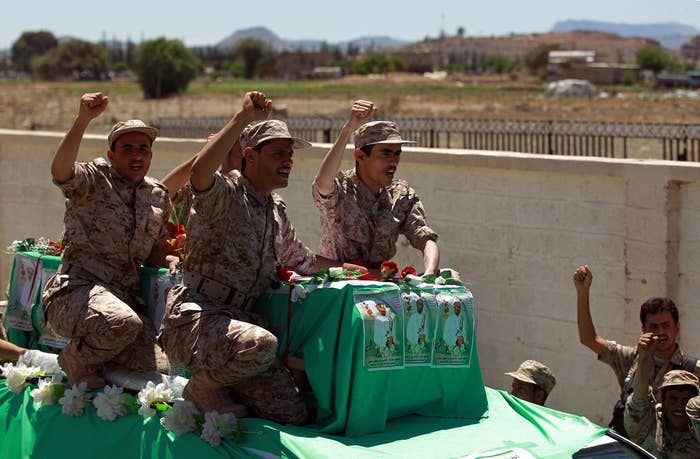
Yemen plunged further into chaos on Wednesday with rumors that Abdu Rabu Mansur Hadi, its internationally recognized president, had fled the country.
Saudi Arabia is positioning troops along Yemen's northern border as Egypt and other Arab countries contemplate a request from what is left of Hadi's government to intervene militarily in the widening conflict. Any such move, however, would likely draw a response from Iran, which has been supporting the Huthis, one of Hadi's main domestic rivals.
The regional brinksmanship, with all its inherent dangers, is being played out as Yemen disintegrates into a series of shifting power blocs split between dueling presidents and a trio of militant groups.
Early on Wednesday, the most powerful of these militant groups, the Huthis, overran a military base recently used by the U.S. to assist in coordinating drone strikes and other counterterrorism activities. Late last week, as the security situation collapsed, the U.S. withdrew 125 Special Operations advisers from the al-Anad military base, further reducing its presence in the country. The U.S. embassy in Sanaa was evacuated in February.
The Huthis, who have seized much of what remains of the state's bureaucracy, continued their march south, seizing key towns on their way to Aden, the port city where Hadi was gathering fighters for a last stand. But by early afternoon Wednesday, as the Huthis massed outside the city, Hadi had reportedly fled. Aides later claimed that he remained in the country, but his current location is unknown and he hasn't been seen publicly. State media, which is controlled by the Huthis, issued a $93,000 reward for his capture.
One Yemeni official, reached by email while he was on the phone helping to coordinate talks between the different factions, said Hadi was still in Yemen. When asked who was in charge, the official, who asked for anonymity due to the rapidly changing situation, replied: "The Supreme Security Committee is running the military and the security services. That's all I can say."
Over the past several months, the Huthis have pursued a simple yet effective military strategy of seize, hold, consolidate, and advance. In September last year, the group moved out of their stronghold in the north Yemeni highlands near the Saudi border, overrunning parts of Sanaa and forcing local enemies to flee the country. Months later, in January 2015, they surrounded Hadi's residence in the capital, eventually forcing him to resign.
Having consolidated their gains in Sanaa, they are now advancing south in a bid to takeover the rest of the country. The Huthis, who are a Zaydi-Shi'a group and receive some support from Iran, have been aided in all of this by former Yemeni president Ali Abdullah Salih, who was forced to step down in February 2012 after 33 years in power.
Unlike his counterparts in Libya, Egypt, and Tunisia, Salih was able to negotiate an immunity deal that allowed him to remain in the country. He has been attempting to undermine the political transition ever since, and late last year was sanctioned by the United Nations.
But it is unclear how long this rickety alliances of former enemies will hold in the absence of a common enemy. Salih and the Huthis have their own bloody history, having fought a series of six wars between 2004 and 2010. If Hadi does not return those old wounds will likely reappear as both sides struggle to gain as much territory as they can.
The Huthis are unlikely to be able to hold much of southern Yemen, which has been demanding independence for years in the face of what many there see as northern aggression. Waiting in the wings and looking to take advantage of the chaos are al-Qaeda and what appears to be an embryonic ISIS group, which claimed responsibility for a pair of massive suicide attacks last week that killed over 150 people. The attacks, which targeted Huthi mosques in Sanaa, were the worst in Yemen's recent history.
Both groups are natural enemies of the Huthis, and each will likely find more recruits as tribes throughout the country look to counter the Zaydi-Shi'a offensive. But the U.S. is less worried about local recruits than it is about the possibility of Yemen becoming the same sort of apocalyptic battlefield as Syria, attracting foreign fighters who will then be able to return home.
Already, with the evacuation of the embassy and now the advisers, the U.S. has less intelligence in Yemen than ever before. On Tuesday, US officials told the Associated Press that the CIA will continue to carry out drone strikes, there will just "be fewer of them."
Whether Saudi Arabia, Iran, and the rest of the region take a similar step back will go a long way toward determining if Yemen merely implodes or if it explodes.
